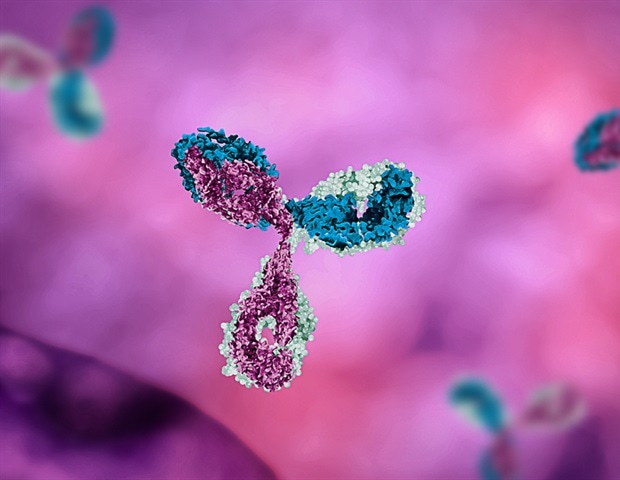
A novel class of antibodies that binds to a beforehand untargeted portion of the malaria parasite might result in new prevention strategies, in accordance with a research from researchers on the Nationwide Institutes of Well being (NIH) printed immediately in Science. Essentially the most potent of the brand new antibodies was discovered to supply safety in opposition to malaria parasites in an animal mannequin. The researchers say antibodies on this class are notably promising as a result of they bind to areas of the malaria parasite not included in present malaria vaccines, offering a possible new device for preventing this harmful illness.
Malaria is a life-threatening illness brought on by Plasmodium parasites, that are unfold via the bites of contaminated mosquitoes. Though malaria shouldn’t be widespread in the US, its world impression is devastating, with 263 million circumstances and 597,000 deaths estimated by the World Well being Group in 2023. Of the 5 species of Plasmodium that trigger malaria, Plasmodium falciparum is the commonest in African international locations the place the burden of malaria is largest and the place younger kids account for almost all of malaria deaths. Secure and efficient countermeasures are essential for decreasing the immense burden of this illness.
Lately, new interventions have been developed in opposition to malaria, together with vaccines that at the moment are being rolled out for younger kids in areas the place the illness is prevalent. Anti-malarial monoclonal antibodies (mAbs) are one other promising new device which were proven to be protected and efficacious in opposition to an infection with P. falciparum in adults and youngsters in early scientific trials. The anti-malarial mAbs evaluated in trials in malaria-endemic areas goal the P. falciparum sporozoite-;the life stage of the parasite that’s transmitted from mosquitoes to folks. By binding to and neutralizing the sporozoite, the mAbs stop sporozoites from infecting the liver, the place they in any other case grow to be blood-stage parasites that infect blood cells and trigger illness and dying.
Essentially the most promising anti-malarial mAbs examined in people so far bind to a protein on the sporozoite floor known as the circumsporozoite protein (PfCSP) at areas close to to or containing amino acid repeats in a area known as the central repeat area. This portion of PfCSP is also included within the two obtainable malaria vaccines. The researchers within the present research aimed to seek out mAbs that focus on new websites on the sporozoite floor.
Led by scientists at NIH’s Nationwide Institute of Allergy and Infectious Ailments (NIAID), the analysis crew used a novel strategy to seek out new portions-;or epitopes-;on the sporozoite floor the place antibodies bind. They remoted human mAbs produced in response to entire sporozoites, quite than to particular components of the parasite, after which examined the mAbs to see if they may neutralize sporozoites in a mouse mannequin of malaria. One mAb, named MAD21-101, was discovered to be essentially the most potent, offering safety in opposition to P. falciparum an infection in mice.
This new mAb binds to an epitope on PfCSP exterior of the central repeat area that’s conserved-;or similar-;between completely different strains of P. falciparum. Notably, the epitope, known as pGlu-CSP, is uncovered solely after a selected step within the improvement of the sporozoite, however it’s extensively accessible on the sporozoite surface-;a state of affairs that the researchers say might imply pGlu-CSP could be efficient at eliciting a protecting immune response if utilized in a vaccine. As pGlu-CSP shouldn’t be included in at the moment used malaria vaccines, mAbs focusing on this epitope are unlikely to intervene with the efficacy of these vaccines if the vaccines and mAbs are co-administered. In line with the scientists, this might present a bonus as a result of this new class of antibodies could also be appropriate to forestall malaria in at-risk infants who haven’t but obtained a malaria vaccine, however might obtain one sooner or later.
Findings from the research will inform future methods for the prevention of malaria and should facilitate the event of recent antibodies and vaccines in opposition to the illness, the researchers point out. The scientists additionally notice that extra analysis is required to look at the exercise and effectiveness of the newly recognized antibody class and epitope, in accordance with their paper. The strategy used on this research might additionally support the event of a brand new era of countermeasures in opposition to different pathogens, along with malaria.
Supply:
Journal reference:
Dacon, C., et al. (2025). Protecting antibodies goal cryptic epitope unmasked by cleavage of malaria sporozoite protein. Science. doi.org/10.1126/science.adr0510.

